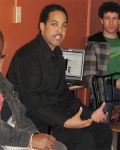There are currently 456 juveniles serving life sentences in the Pennsylvania Department of Corrections. At a meeting held by the Pittsburgh Chapter of the American Civil Liberties Union, community leaders discussed the concept of the school-to-prison pipeline, a system they say accounts for the large numbers of African-American male juveniles in the prison system.
 |
| ONE HOOD—Jasiri X facilitates an ACLU discussion at the Amani International Coffee House in the North Side.
|
Meeting leader Jasiri X of One Hood, an organization that works to defeat street violence, said the school-to-prison pipeline has been facilitated by disciplinary policies that push students out of classrooms and into prisons. He said this has occurred due to the increase in zero-tolerance disciplinary policies, disciplinary alternative schools and the installment of police officers in schools.
“We have heard about a school where they told the students ‘if you’re in the hallway you get arrested’,” Jasiri said. “And there was also the incident where a 5-year-old girl was handcuffed and arrested.”
While the group did place blame on the school systems for criminalizing students, they also addressed issues within the community such as irresponsible parenting. They resolved to create a support system for children whose parents aren’t actively engaged in their education.
“Yes we need to push the legislative change, the political change and the administrative change, but we also need to push internal change,” said Khalid Raheem, president of the National Council for Urban Peace and Justice. “There’s still a lot of work we need to do in ourselves and our families.”
Raheem pointed to drug activity as a major factor in the school-to-prison pipeline. He said it keeps parents from focusing on fighting institutional injustices and pushes students down the wrong path.
“We’ve been knocked out from this dibbling and dabbling in drugs and drug trafficking,” Raheem said. “You cannot launch any struggle for liberation and freedom if you’re drunk or high.”
Others at the meeting pointed to stress factors such as absent parents and irresponsible parents as reasons children misbehave in school. Often times, they said symptoms of stress are ignored until it is too late.
“These are the underlying issues that are making these kids angry and sad,” said Iasia Eybers, program manager, Urban Youth Action. “There’s some underlying issues before they even get shackled and put in the car.”
Others at the meeting agreed that the police presence is too strong in schools today. They also brought up cases where they feel tasers were used unjustly against students.
Many said there should be social workers in the schools who advocate on behalf of the students in case parents do not take the responsibility. Former social worker Kelly Parker also added that teachers should be trained on how to deal with at-risk students who misbehave.
“I believe the screaming and hollering at kids at such a young age needs to go,” Parker said. “They need to understand they’re dealing with children.”
The meeting was the second in the ACLU’s three-part “Juvenile Justice Series.” The last session will be on Nov. 13 and will focus on the Youth Promise Act.